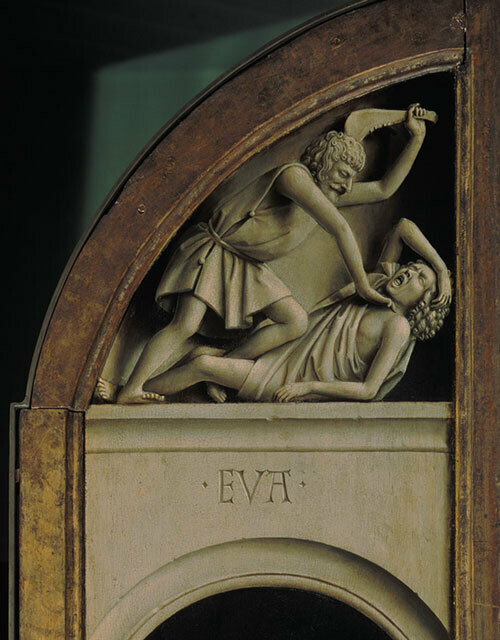21st Annual Mellon Colloquium: "The Invention of Homicide: Crime, Honor, and Spectacular Justice in Late Medieval Flanders"

Join the Medieval Institute for its twenty-first annual Mellon Colloquium. The colloquium is a half-day public seminar discussion with the institute's 2022–23 Mellon Fellow, Prof. Mireille Pardon (Assistant Professor of History, Berea College), on her book-in-progress, joined by three distinguished respondents: Andrew Brown (Massey), Chanelle Delameillure (KU Leuven), and Ellen Kittell (Idaho).
Professor Pardon's project examines how people thought about homicide in fifteenth-century Flanders, and how changes in the perception of killing over time impacted judicial practice. Medieval reconciliation procedures, a feud-like understanding of violence, and an emphasis on pecuniary penalties declined as spectacular, bodily punishment took center stage. Drawing on the wealth of archival resources for late medieval Flemish cities, her work explores slow cultural shifts in concepts of honor, masculinity, and the common good to give a new perspective on the birth of early modern punitive justice.
This event will be held in-person as well as over Zoom. Please register for Zoom to reserve your virtual spot. No registration is required for the in-person event.
Questions about this event? Email us at medinst@nd.edu
Schedule
9:45 a.m. Refreshments
10:00 a.m. Opening remarks
10:05 a.m. Speaker 1: Mireille Pardon, "The Invention of Homicide: Crime, Honor, and Spectacular Justice in Late Medieval Flanders"
10:25 a.m. Speaker 2: Chanelle Delameillieure, "The Perks and Perils of Being an Heiress: the Criminalization of Abduction with Matrimonial Intent in Late Medieval Ghent"
About the speaker: Dr. Delameillieure is a lecturer at the research group for medieval history at KU Leuven (University of Leuven). Her research concerns medieval family and gender history and the social history of law and justice in the late medieval Low Countries. Her first monograph will appear soon at the 'Gendering the late medieval and early modern world' series with Amsterdam University Press.
Talk abstract: As Mireille Pardon’s book does, this paper talks about evolutions in law and prosecution, and changes in social behaviour and/or the perception of crime and responsibility in the late medieval Low Countries. This paper focuses on marriage by abduction, not on homicide, and points to local, contextual factors to explain this offence’s criminalisation or even "invention" in the late medieval Low Countries. A study of Flanders’ legal texts and records (with a focus on Ghent) reveals a growing intolerance of abductions with matrimonial intent and marriages made outside of the family’s control between the twelfth and fifteenth centuries. I will argue that women enjoying inheritance rights and middling group families having significant power in Low Countries’ cities, led to an increased desire to control young men and especially women’s life choices. This resulted in the criminalisation (or invention?) of consensual marriages without parental consent in a way that is striking when compared to other European regions.
10:45 a.m. Coffee Break
11:00 a.m. Speaker 3: Ellen Kittell, "Discussion of Mireille Pardon's The Invention of Homicide: Crime, Honor, and Spectacular Justice in Late Medieval Flanders"
About the speaker: Ellen Kittell, Professor of History at the University of Idaho, initially focused on the evolution of medieval bureaucracy. Intrigued by a chance encounter with a list of local receivers, a third of whom were women, she decided to investigate further. Articles such as “Guardianship over Women in Medieval Flanders,” “Travelling for Antonement: civilly imposed pilgrimages in medieval Flanders,” “Patriarchal Imperialism and the Narrative of Women’s History,” and “Whether Man or woman: Gender Inclusivity in the Town Ordinances of Medieval Douai" (with Kurt Queller) followed. She is currently dividing her time between studying medieval Flemish siblings and indexes as problematically gendered arenas.
11:20 a.m. Speaker 4: Andrew Brown, "Homicide, Recreation and the State: Petitioning the Prince for Mercy in the Late Medieval Low Countries"
Talk abstract: Dr. Mireille Pardon’s work identifies an important change in the way homicide was conceptualized and punished in late medieval Europe, and it relates this change to wider issues concerning the power of the state over its subjects. My talk considers how subjects convicted of homicide petitioned rulers for clemency, and the strategies they used to achieve it. More than 2,000 letters pardoning supplicants survive in the chancery registers of the Burgundian and Hapsburg rulers of the Low Countries between 1386 and 1520. In a surprising number of letters, supplicants refer to the recreation they enjoyed—their games, festivities and playful delight—before they committed homicide. This was evidently a useful ploy in a legal context within a ruler’s court of law; but does its use have more to tell us about the social importance of recreation, and the relationship between recreation and the process of state-formation?
About the speaker: Andrew Brown is a historian of late medieval religion, ceremony and recreation, particularly in the Low Countries and England. His most recent articles on games appear in Speculum (2021) and The English Historical Review (2021), and his most recent book, co-edited with Jan Dumolyn, is Medieval Bruges c. 850-1550 (Cambridge University Press, 2018). He is Professor of History at Massey University, New Zealand, where he has lived since 2010. Previously, he was a senior lecturer at Edinburgh, UK, and a Fellow by Special Election at Keble College, Oxford.
11:45 a.m. Lunch (provided)
12:15 p.m. Questions and Discussion
1:00 p.m. Conclusion